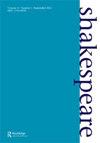2022年9月3日,《马洛的浮士德博士》(由瑞奇·杜克斯为拉撒路剧团执导)在伦敦南华克剧院上演
IF 0.2
3区 文学
0 LITERATURE, BRITISH ISLES
引用次数: 0
摘要
南华克剧院原计划于2020年搬迁,但新冠肺炎疫情使其暂停,剧院距离救世军仍只有几扇门之遥,这使它成为拉扎勒斯剧院强大而快速的《浮士德医生》制作的一个令人愉快的讽刺地点。故事在一间书房里悄悄地开始了,书房里有三张桌子、垂钓灯、一部我父母用过的那种台式电话,还有我在学校用过的同样的杠杆拱门,这让主人公对我来说就像是一个当代人,但可能是为了更年轻的观众而和他约会的。我想起了皇家莎士比亚剧团(Royal Shakespeare Company)的《坦伯兰》(Tamburlaine),费兹国王(King of Fez)的汤米·库珀(Tommy Cooper)的笑话逗乐了观众,但却让其他观众不寒而栗;这种对相对较近的过去的认可显然在一定程度上与人口结构有关,他们可以定期去剧院,但我想知道他们是否也能让马洛看起来像一个老了但没有那么老的人,一个感觉自己是历史的一部分的人,我们仍然可以在生活记忆中认识到这一点。对我来说,有一种与过去类似的刻意联系的感觉,当这部作品开场时,一个只穿着内裤的男人缓慢而刻意地走过舞台,一个穿着整齐的浮士德在后面一段距离跟着,就像人类进化的小插曲,从某种程度上看,“伸展到人的心灵”(1.1.63)是文艺复兴时期人文主义野心的证明,还是对浮士德实际成就甚微的讽刺性评论。本文章由计算机程序翻译,如有差异,请以英文原文为准。
Review of Marlowe’s Doctor Faustus (Directed by Ricky Dukes for the Lazarus Theatre Company) at the Southwark Playhouse, London, 3 September 2022
The Southwark Playhouse was scheduled to move in 2020, but Covid put that on hold and the theatre is still a few doors down from the Salvation Army, making it a pleasingly ironic location for Lazarus Theatre ’ s powerful, pacy production of Doctor Faustus. The story opened quietly enough in a study equipped with three tables, anglepoise lamps, a desk telephone of the kind my parents had and the same lever arch fi les as I used at school, which made the hero feel like a contemporary to me but presumably dated him for younger audience members. I was reminded of the Royal Shakespeare Company ’ s Tamburlaine , where the King of Fez ’ s Tommy Cooper joke amused the over-fi fties but left the rest of the audience stone cold; such nods to the relatively recent past are obviously partly to do with the demographic that can a ff ord to go to the theatre regularly, but I wonder if they also have the e ff ect of making Marlowe seem a fi gure who is old but not that old, someone who feels like part of a history that we can still recognise as within living memory. For me there was a similar sense of deliberate connection to the past when the production opened with a man clad only in underpants walking slowly and deliberately across the stage with a fully-dressed Faustus following at some distance behind like a vignette of human evolution, in a way which glances at the question of whether ‘ stretcheth as far as doth the mind of man ’ (1.1.63) is a testament to Renaissance humanist ambition or an ironic comment on how little Faustus actually achieves.
求助全文
通过发布文献求助,成功后即可免费获取论文全文。
去求助
来源期刊

Shakespeare
Multiple-
CiteScore
0.30
自引率
33.30%
发文量
37
期刊介绍:
Shakespeare is a major peer-reviewed journal, publishing articles drawn from the best of current international scholarship on the most recent developments in Shakespearean criticism. Its principal aim is to bridge the gap between the disciplines of Shakespeare in Performance Studies and Shakespeare in English Literature and Language. The journal builds on the existing aim of the British Shakespeare Association, to exploit the synergies between academics and performers of Shakespeare.
 求助内容:
求助内容: 应助结果提醒方式:
应助结果提醒方式:


